All of us would like to believe that everything we’re able to purchase at the grocery store is safe.
And those baby lettuces and that bag of chopped romaine say they were triple washed, right?
If you’ve been at all aware of the news over the past decade or so (and we’re sure you have been) then you might at least hesitate a little before tossing a few bags of prepackaged salad mix into your cart at the grocery store.
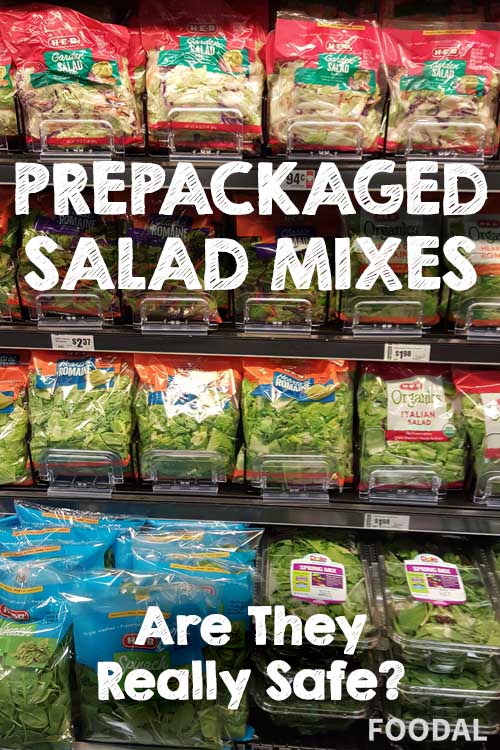
Journalists have reported the often-scary details of food poisoning outbreaks that were traced back to contaminated spinach or leafy greens multiple times throughout the years, which sometimes resulted in hundreds of cases of illness and even a few deaths.
Nonetheless, packages of pre-cut and washed salad blends still line the shelves in the produce aisle, beckoning to us invitingly. Crunchily. Tastily.
They must be okay to buy if the stores are still stocking them, right?
Are those prepackaged Caesar salad kits and boxes of baby greens really safe? Read on to find out.
Convenience with a side of vitamins (and potential side effects?)
In our never-ending search for foods that are both healthy and convenient, salad kits, premade salad bowls, bags of washed and pre-sliced romaine and clamshells of fresh baby greens offer the best of both worlds.
Fresh leafy greens are packed with nutrients, and the words “prewashed” or “triple-washed” get a thumbs up from us. Well, for the most part.
According to food-safety-and-you.com, leafy greens are the riskiest food that you can eat, in terms of food safety.
This seems a bit harsh, and it’s important to point out right away that the potential dangers are minimal. While it’s true that leafy greens are associated with a high number of food poisoning outbreaks in comparison to other types of foods, the lettuce itself isn’t inherently dangerous and the risk of food poisoning is slim.
Here’s what you need to know, and what you can do to get your salad on safely.
Prepackaged lettuce’s journey from seed to store matters
In order to understand what’s really going on here, it’s important to keep in mind that food safety is important at all phases of food production. We’re talking about food safety on the farm, during harvest and processing, throughout packaging, shipment, storage and sale, and finally, in your own home.
You could cut out the middleman, it’s true.
If you’re able to cultivate your own vegetables (or forage for your own nutritious dandelion greens), you can keep an eye on just about every phase of the handling of your leafy greens yourself. Of course, growing them at home isn’t the most convenient option, especially when summer is over and colder weather begins to set in.
When food is nutrient-dense, the benefits outweigh the risks
Overall, Americans don’t eat nearly enough vegetables.
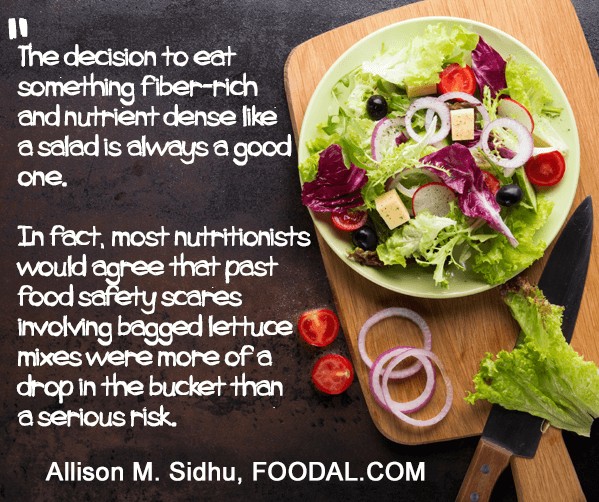
The decision to eat something fiber-rich and nutrient dense like a salad is always a good one. In fact, most nutritionists would agree that past food safety scares involving bagged lettuce mixes were more of a drop in the bucket than a serious risk.
Though food poisoning and possible contamination at some point along the food production and distribution chain definitely isn’t something to scoff at, it’s extremely rare.
In terms of health, the benefits of eating a healthy salad definitely outweigh the risks.
Being able to pick up a premade salad bowl at the deli when you’re on the run or stocking your fridge with fresh greens that are ready to eat makes it that much more likely that you’ll make the healthy choice. This beats settling for something like chips or a handful of candy every time.
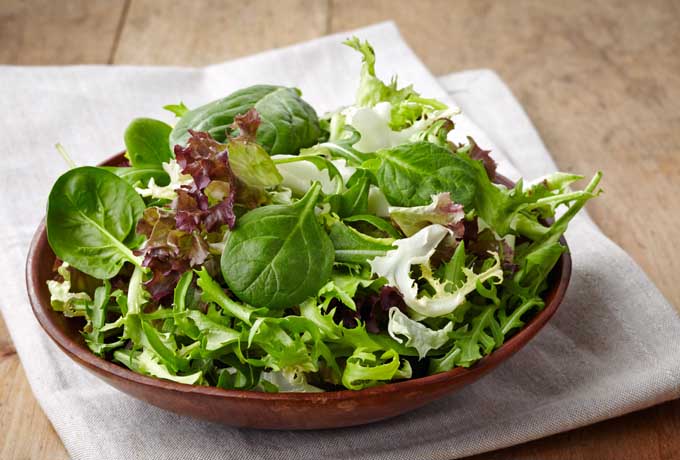
Most of us already eat way too many foods that are high in calories, but low on nutrients.
Sure, making salad into a convenience food is genius marketing, but this is one case where everyone can benefit.
What’s not to like about prepackaged lettuce? A few things…
Some people say they actually don’t like prewashed bagged salads because they have a gritty texture, they’re slimy, or the flavor is a bit off.
Let’s take a quick look at all three of these problems to figure out exactly what’s going on here, particularly in terms of whether or not bagged greens are safe to eat.
Here’s the deal:
The nitty gritty
First, when it comes to grittiness, it’s time for some real talk. Let me lay it on you.
Are you ready for this? Okay, here goes:
Vegetables grow in the dirt.
I’ll give you a second to digest that.
But really, dirt is… dirt. We don’t want to eat it, but we can’t grow our food without it.
Depending on where we shop for our fruits and vegetables, we tend to be okay with varying levels of dirt. If you’re at the farmer’s market you might expect a little more, and a little less at the fancy grocery store down the street.
But when it comes to prewashed salad mix that comes in a bag, cut and ready to go, dirt isn’t exactly part of the bargain.
Scrub-a-dub (gently!)
The thing is, lettuce is filled with nooks and crannies. It isn’t the easiest vegetable to wash.
It’s too delicate for a deep scrub, but sometimes the sand and grit just has a way of getting in there and it doesn’t want to let go.
When you’re washing lettuce yourself at home, you can separate the leaves with your fingers and look at it, examining every leaf as you swoosh it around in cool water or run it under the faucet.
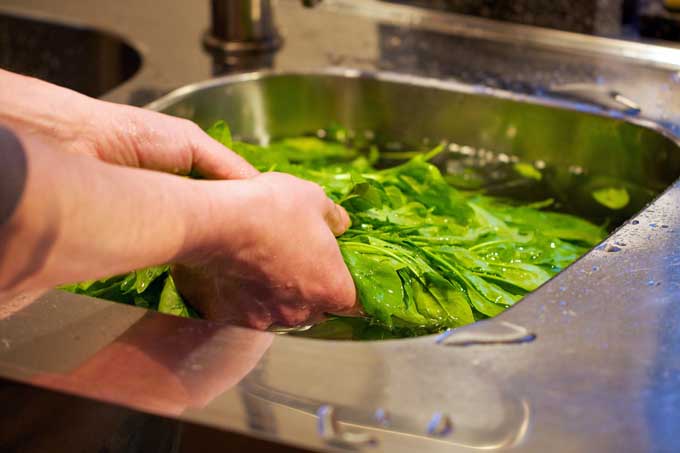
This may come as a surprise to some of you, but believe it or not, the commercial machinery used wash your bagged lettuce isn’t nearly as fine-tuned, attentive or delicate as you are. Shocking, I know!
When lettuce is being washed, prepped and packed on a large scale, lots and lots of lettuce is being processed at a time. These cleaning systems aren’t always perfect, and sometimes a little dirt or grit gets through.
On the other hand, commercial lettuce producers use something in their lettuce cleaning processes that most of us don’t incorporate at home. What’s that, you ask?
A lettuce cleaning solution for the masses
We’re talking about chemical additives.
Okay, okay, don’t be alarmed! These are not akin to potentially harmful pesticides and they’re nothing to be feared.
They’re actually used to improve the industrial cleaning process, and they do a pretty good job.
That prewashed or triple-washed lettuce doesn’t simply go through a few cycles under the sprinkler before the machines dry it off and pop it into a bag.
Instead, chemical solutions containing things like chlorine and ozone are added to the washing water to form an effective cleaning solution.
A special secret formula
Some of the bigger lettuce packing brands have even developed proprietary mixtures that they use as part of their patented cleaning processes.
In fact, many companies describe these special blends on their packaging, as part of their effort to ensure that you, the customer, feel safe eating their product and are reassured that you have made the best possible choice in the produce aisle.
In case you haven’t noticed these descriptions of the latest state-of-the art lettuce cleaning compounds already, remember to check it out the next time you’re at the supermarket. Flip over that package of your favorite name-brand lettuce mix or check the backside of a few clamshells of baby spinach or spring mix.
Already have some in the crisper bin? Take a look at what it says on the back of that bag.
I’ll wait.
You can find this information via a quick Google search, too.
But how does it taste?
The thing about these chemical washes is that, although they’re GRAS (or Generally Recognized As Safe, meaning they can be used on food products according to certification by the FDA) they sometimes create that “off” flavor that prepackaged salad mix detractors find less than appealing.
This can also occur due to the fact that the lettuce was precut and washed, and then placed in a plastic bag for a week or two before you brought it home.
Astronauts and soldiers on the front lines often express complaints like these about the food that they’re served, and airplane food has a similar reputation. Wanna guess why?
All of it is prepackaged, for starters.
Freshness you can taste
Some would definitely argue that it’s a shame to take something fresh out of the ground, cut it up, and wrap it in plastic rather than eating it right away. Many experts argue that the nutrient content of fresh produce begins to degrade as soon as it’s harvested.
This process continues while your lettuce or other types of vegetables or fruit sit on the shelf, and can happen to an even greater degree once that lettuce is cut or otherwise processed.
And that brings us to the other common complaint that plagues the bagged lettuce consumer…
Slime!
That’s right, and everybody out there who has ever bought a back of prepackaged lettuce knows what I’m talking about.
That’s right. You know those leaves that are somehow overly wet, or past their prime? They’re squishy and gross. But are they actually unsafe? Well… probably?
The thing is, slime is just another word for rot, and rotting vegetables harbor bacteria.
Sometimes, we’re talking about lots of bacteria. Whereas one or two microorganisms might slide past the teeth and gums without hurting you, a larger colony of something harmful can make you really sick.
Slimy lettuce is way past its prime, and you should definitely toss it without question.
When lettuce has been washed, cut and packaged, it tends to go spoil more quickly. Sometimes preservatives are used to maintain freshness or the bags are punched with special holes that allow it to respire (or breathe), but let’s face it: death is just a fact of life, especially where highly perishable vegetables are concerned.
Lettuce isn’t exactly the heartiest vegetable in the bin, and it doesn’t last long on the shelf or in the fridge.
So, what can we do about all of the grit and slime and off-putting flavors? And more importantly, are bagged salad mixes really safe?
Studies have shown…
Real quick, let’s see what the experts have to say.
According to the CDC, e. coli outbreaks have been on the rise for the past decade. In response to documented cases of food poisoning, regulations have been strengthened and large-scale lettuce producers have responded with tighter production methods, as well as frequent testing and monitoring of their fields and processing facilities.
The trouble with potentially harmful pathogens known for causing outbreaks of food poisoning, like e. coli and cyclospora, is that they can’t be washed off.
Wait a minute, what?
Yup, you heard me. The basic premise of this whole mess in terms of food safety scares and food poisoning outbreaks when it comes to prepackaged lettuce is this: the microbes that have the most potential to do harm in terms of human health don’t simply wash off.
In fact, washing can actually cause cross-contamination when big batches of lettuce are washed together in industrial cleaning and processing facilities along with an infected portion.
Here are some more problem areas along the production chain that can result in less-than-safe bagged lettuce:
• Some experts blame the proximity of fields where crops are grown to areas where herd animals are kept or allowed to graze or otherwise feed.
• Other outbreaks of pathogens related to leafy greens have been traced back to instances where wild animals passed through the fields where the crops were grown (though more recent studies have shown that culling wild areas immediately adjacent to cropland seems to actually have had the opposite of the intended effect, resulting in more documented cases of e. coli contamination).
• Cases of unmitigated flooding have been addressed as potential culprits, as well as the use of unsanitary water or contaminated compost or fertilizer to grow the greens, or to wash them later.
• Unsanitary conditions among workers in the fields or cleaning facilities have also been blamed, and cases of illness among workers who should have remained at home (but who, more often than not, were not given the “luxury” of sick days) have been named, too.
Washing prepackaged salad is just one piece of the puzzle
Bacteria and other pathogens that are potentially harmful can be introduced in the fields, or after the lettuce is harvested. Sometimes cross-contamination occurs during the cleaning process, or when the lettuce is cut into bite-sized pieces.
No matter how you look at this issue, whether or not packages that say “prewashed” or “triple-washed” are actually safe, and whether or not they should really be trusted, is just one small part of a much bigger picture.
Tip time!
In the end, there are some things you can do at home if you want to have your conveniently pre-washed and prepared lettuce and eat it, too.
In terms of saving time, you’re probably not going to like this. In terms of preserving flavor, texture, and possibly your health, it’s probably a good idea.
There’s one simple trick that you can try, and it’s easy enough to do yourself at home.
Can you guess what it is?
Wash your lettuce.
That’s right.
Even the prepackaged salad mix, the pre-cut romaine, the triple-washed baby spinach, the prewashed arugula or the bagged radicchio.
Wash them all!
Washing the leafy greens that you buy (or grow!) yourself gives you another shot at removing any “bad” bits (yeah, you got it—those slimy guys, and the occasional non-lettuce item), rinsing away any grit, and washing away or at least diluting some bacteria, if it’s there.
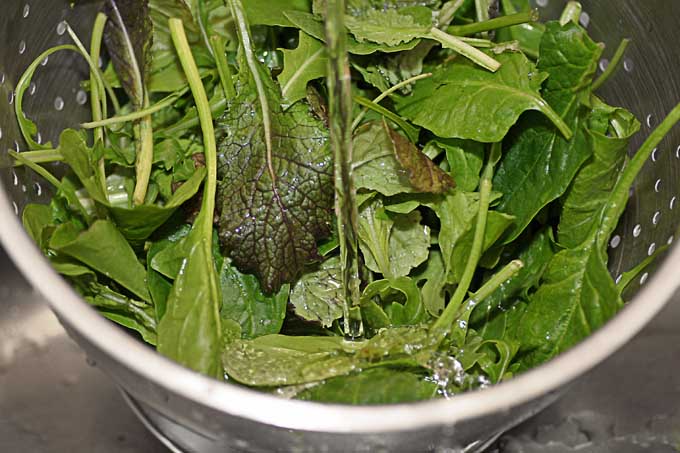
You know because we went over this already that e. coli and cyclospora are known for their sticking power, and salmonella is, too.
When Consumer Reports did their own test of bacterial contaminants in lettuce a few years ago, they founds coliforms and enterococcus instead, bacteria that are “common indicators of poor sanitation and fecal contamination.”
Still unhealthy and unpleasant, but not quite as deadly as some of the other microorganisms mentioned here. They definitely don’t belong on lettuce though, especially lettuce claiming to be “prewashed.”
An extra-thorough rinse (or three) under cool running water and a trip through the salad spinner may be enough to give an added boost of protection to yourself and your family.
Most types of vegetables are actually washed at least once before they arrive at the grocery store, and you wash them anyway before you cook them, right?
(Quick newsflash: if you’re not already washing all of your produce before you cook it, get started today!)
Did someone say cook?
On that note, here’s something else that you should know about e. coli and salmonella:
All of us have heard stories about these harmful pathogens in the news, but these particular cases of food poisoning weren’t related to prewashed salad mixes or bagged leafy greens at all.
No, instead we’re talking about outbreaks of illness related to ground beef and eggs.
In case you missed it, here’s why these stories are dealt with a bit differently (and no, it’s not because we don’t typically rinse our ground beef or wash our eggs before we use them).
It’s in the way we eat them. So what could it be…?
Well, we don’t cook lettuce. It’s as simple as that.
While salmonella and e. coli can be cooked away at high enough temperatures (which is why food safety experts and many restaurant menus advise against eating ground beef and egg products that have not been thoroughly cooked), they’re able to thrive on products that are eaten raw.
Raw like lettuce, prewashed or not.
None of this advice is meant to scare you. At least not enough that you ban fresh, leafy greens and prewashed lettuces from your kitchen and your table for the rest of your life.
To the contrary! Rather, our intention here is to explain what’s really going on with lettuce, and what you can do to ensure that you’re feeding food that’s both healthy and safe to your family.
Keep it cold and throw out the old stuff
In addition to washing your lettuce before you eat it, whether it’s already been washed or not, try to keep an eye on the expiration dates on prepackaged lettuce and always store it in the refrigerator (kept below 40ºF!) Bacteria likes to breed at room temperature, and it can multiply over time.
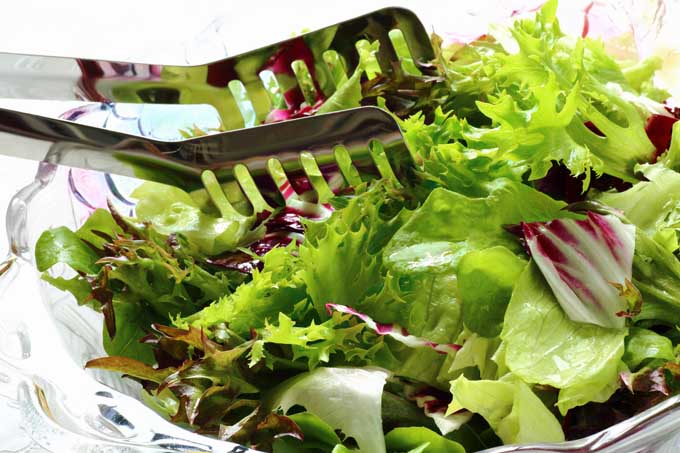
Leafy lettuces that have been precut are not the same thing as whole head lettuces in terms of food safety. Whereas potential contaminants are generally unable to gain access to the inner leaves of a head of lettuce, leafier lettuces provide more open access and cutting exposes the leaf membranes to potential invasion by bacteria and pathogens.
Again, outbreaks of food poisoning are rare, but in cases where bacteria is present, it tends to multiply with time.
Expiration dates on the packaging are a good way to keep track of how long that lettuce has already been around since it was picked and processed, and how long it might remain fresh enough to eat.
The longer you wait, the more likely it is that any unhealthy invaders may gain the ability to make you sick.
Don’t cross-contaminate either!
When you’re washing your lettuce, be careful not to introduce any additional potential pathogens.
To avoid cross-contamination in your own kitchen, never mix utensils, cutting boards, bowls, etc. that have been used to prepare raw meat or fish with those used to prepare vegetables.
Keep raw foods separate from cooked foods, and don’t just dunk veggies into the sink to wash them.
That one’s worth saying again.
Don’t dump a bagful of lettuce directly into the sink.
Ever.
This is fine for dishes, since you’re going to be using soap to wash them. But you’re definitely not going to wash your lettuce with soap.
Sinks hold bacteria, and they’re a ripe breeding ground for cross-contamination. Remember: You’re trying to make your food safer to eat, not (potentially) less safe!
Instead, rinse lettuce under cool, running water in a clean colander that hasn’t been used for anything else.
Here’s another tip:
You don’t need to wash the whole container of leafy greens at once.
If you wash just what you’re going to use right away, your lettuce will last longer in the refrigerator.
This brings us back to those slimy bits that you find yourself pulling out of the bag after the spinach or baby greens have been hanging around for a few days.
Adding moisture to lettuce by washing it and then putting the delicate leaves back into the refrigerator in a tight bag or container without adequate airflow helps it to spoil faster, kinda defeating the purpose of washing it in the first place.
If you can guess how much lettuce you plan to use at a time, hold off on washing the rest until you’re ready to eat it.
You can also use a salad spinner to assist with the drying process or simply wash your greens with a colander and then let it drip dry and pat down with paper towels.
Keep eating those vegetables
Finally, don’t freak out too much and eat your veggies every day!
Though the risk of contamination, recontamination, or new cross-contamination is real, it’s on the low side if you’re careful about kitchen safety.
Inspect the packages of lettuce that you intend to buy and make sure they’re cold and fresh looking.
Check expiration dates, and wash lettuce before you intend to eat it.
Keep it cold, eat it quickly, and throw away anything that’s rotten, off-tasting, or otherwise unappealing.
What are you waiting for? It’s salad time!
About Allison Sidhu
Allison M. Sidhu is a culinary enthusiast from southeastern Pennsylvania who has returned to Philly after a seven-year sojourn to sunny LA. She loves exploring the local restaurant and bar scene with her best buds. She holds a BA in English literature from Swarthmore College and an MA in gastronomy from Boston University. When she’s not in the kitchen whipping up something tasty (or listening to the latest food podcasts while she does the dishes!) you’ll probably find Allison tapping away at her keyboard, chilling in the garden, curled up with a good book (or ready to dominate with controller in hand in front of the latest video game) on the couch, or devouring a dollar dog and crab fries at the Phillies game.

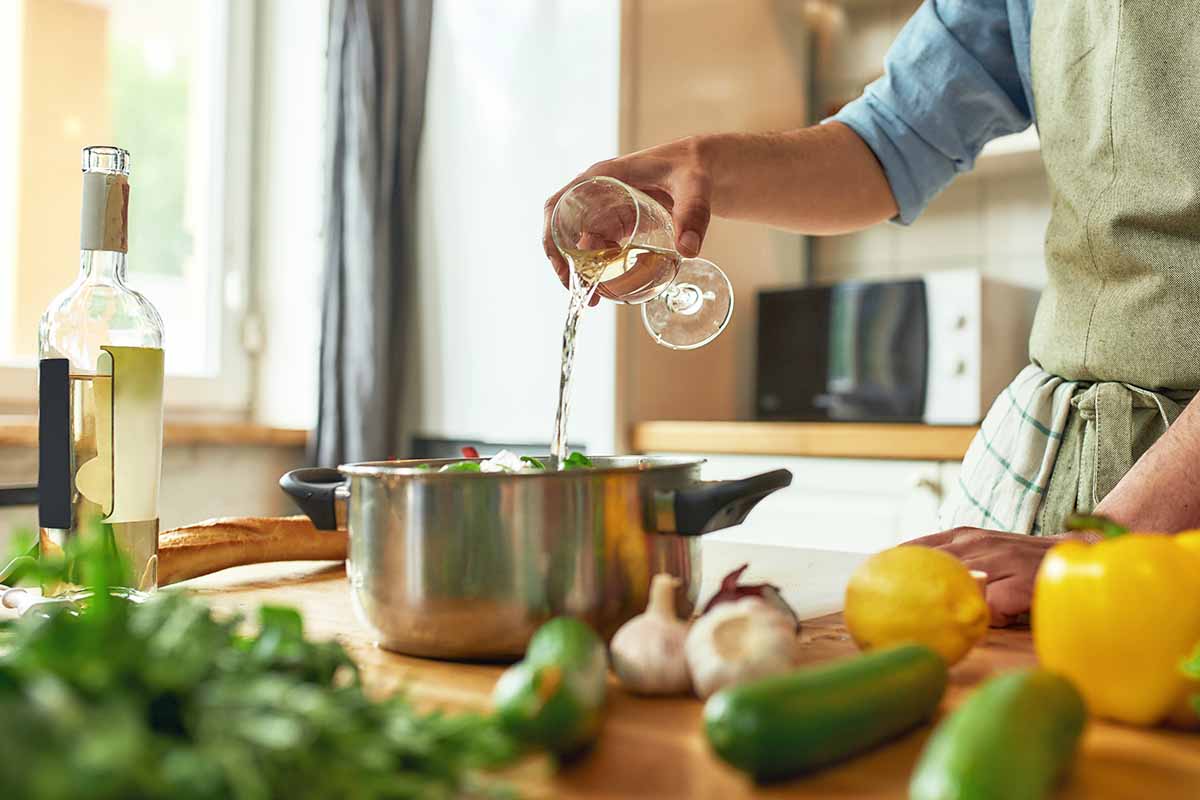

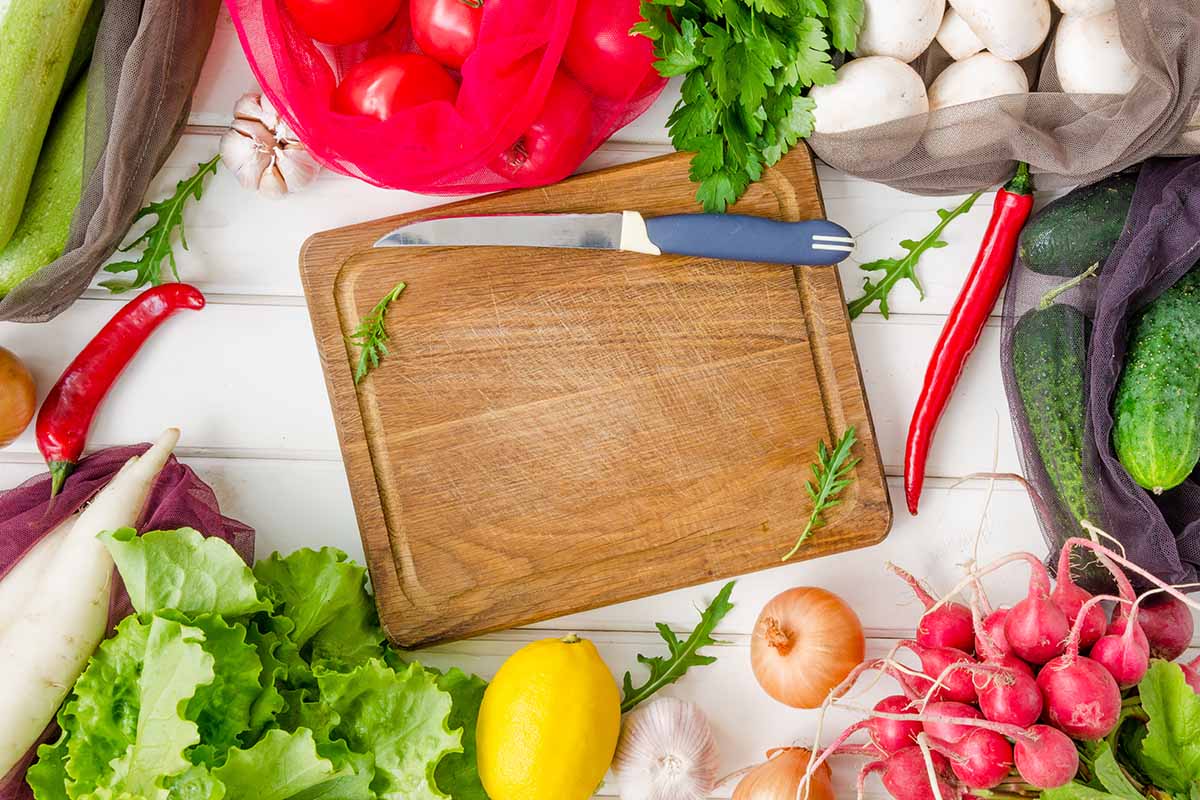
I believe in washing all vegetables too. Whether pre-cut or not. I don’t normally buy pre-prepared salads though because I always believed that they added some kind of preservative to keep them so crunchy for so long.
Best to choose organic that’s loose no package at all wash it dry it and put in a sealed glass container in vegetable bin.
I always wash anything prepackaged just to be on the safe side. It’s merely convenience and appeals to a market for people don’t like to chop. Personally I find them expensive and contain bits I don’t like, but people should not think they are 100% safe just because they have come from a packet.
This is an excellent article. Quite pertinent information. I think a lot of people rely on the statements on the packaging, to their peril. I still wash everything.
My husband used to work in produce, so I know more than I care to, but yes, it’s good to know. There is a lot of dirt and other stuff that I don’t want to eat or feed my family, so I wash and rinse every single thing. I probably even go a little overboard, but it is what it is. People laugh when they see me washing, rinsing *and sometimes drying my lettuce with a paper towel. It works for me though.
I definitely dry my lettuce too, especially if I’m not going to be eating it all right away. But I have to say- a salad spinner is definitely the way to go (and it doubles as a serving bowl/storage container!)
When someone deals in produce, and sees it actually coming from the fields, it lends an entirely new perspective. So yeah, I wash and scrub the heck out of every item…
I should definitely pick up a spinner one of these days. What I also miss is my Salad Shooter. I loved that thing. Do you know of any similar products like it?
Thanks for another thoughtful and though provoking post. We’re lucky in having a kitchen garden allowing us to grow al sorts of different salad and green crops and the making of a salad begins by pottering outside with a bowl and gathering a mix to suit whatever we’re going to eat them with. Then they get washed and dressed and they’re good to go.
Others, however, are not so fortunate as we are, and to have the range of leaves to choose from the ready mixed salad pack is the economical alternative. Personally I don’t think a bit of grit ever hurt anyone, but yes, I too would wash a bought-in salad before eating it.
Thank you for this article!! I love those mixes and I ‘ve actually never thought they could be anyhow unhealthy!!! I am glad I am aware of that now!
Thank you for this post. I had no idea that prepackaged salad can be so troublesome! As most people, I’ve assumed that it must be 100% clean and fresh. I know that it wasn’t your point to turn people from healthy food, but I think I’m gonna avoid those and prepare my own salad mixes. That way I’ll feel safer and I won’t be nervous about tasting the gross slime on my lettuce.
Thank you for this post! I have been wondering if packaged vegetables are safe to eat, and this has answered that. Thank you for the solutions to try and prevent poisoning as well. This was very informative.
This is very educational. I already mostly make my own salads rather than buying pre-packaged ones because it’s almost always better to eat fresh food than packaged and processed stuff. But I didn’t know much about the details of why pre-packaged salads can have deleterious health effects, and now I do. I also appreciate the highlighting of the fact that bacteria contamination in food is very rare. A lot of people blow food poisoning way out of proportion, and use it to justify broad generalizations, such as saying that pre-packaged salads are evil and want to kill you. This post is very reasonable without catering to extremist opinions.
Without a doubt the convenience of prepackaged salads can’t be denied. It makes healthy eating so much easier. I’ve always been a little apprehensive about them due to the news of dead animals found in them (frogs, lizards, butterflies etc.) and other forms of bacteria, but you have really laid a lot of my fears to rest with all the useful insight you provided us. I had food poisoning a few years back and that made me even more fearful. Recently I started washing my salads with white vinegar due to a recommendation of some Caribbean friends, and let me tell you it works wonders. When I add a little vinegar to the water that I’m using to wash the greens you can actually see residue and dirt at the bottom of the bowl. Let’s hope it keeps working!
Before anything else, I’d like to say how I love this article! It’s complete and factual.
Thank you, also, for talking about bacterial contamination being rare. Though some people act like food poisoning is a death sentence, I don’t know a single person who has ever had it. True, food poisoning is something terrible to go through but in my humble opinion some people overreact.
Like others have pointed out, prepackaged food has a lot of upsides. I myself am quite busy so it’s often hard to find the time to cook properly – or if I get home late, I simply don’t want to spend a lot of time in the kitchen. Still, I want to be a healthy cookie so prepackaged takes some of the load off my shoulders. I don’t have to turn to McDonald’s or other such places (once in a while this would not be an issue but once a week would).
I myself usually was lettuce and other vegtables right before using/consuming it though I did learn something from this article! My habit simply stems from how I was taught to cook – and it actually makes more sense to me than washing everything and then putting it back in the fridge.
Sorry for the slight ramble here, I will leave it at this haha
I am notorious for grabbing pre-packaged lettuce/veggie mixes, whether it’s a convenience for tacos, or just a quicker way to make a salad, I buy them all the time! I really appreciate the balance and objectivity of this article. It isn’t preachy and it offers both sides of the equation. I am going to think about it more from now on, and weigh the risks against the benefits.
I will buy pre packaged salad because it’s often more convenient. I also wash it even though it says it’s pre washed. I definitely prefer to buy a fresh bunch of lettuce but alot of times it’s just easier to buy the bags of lettuce. I never really think about the dangers associated with it.
Great information, thanks! I buy a lot of packaged greens as well, it seems so convenient, and almost always add them to my meals. I always try to clean them well enough. I think that if I do that, it’s worth it for the yummy nutritious salads.
I take packed snacks whenever i go for a picnic. Many of my friends have warned me of the dangers of continuous consumption of packed snacks. I have also read articles supporting the same. I have never been keen about it until now. Can anyone who has suffered due to excess consumption of any packed food advice me?
Perhaps these dangers that your friends have warned you about pertain more to pre-packaged foods that are highly refined and high in salt, sugar and fat? Or maybe they’re referring to potential dangers due to a lack of refrigeration when you’re on the go? I think both would be great topics to cover in a future blog post.
Most of us do not get enough fresh fruits and vegetables in our diets. Whether they’re pre-washed and sliced or whole, fresh produce is a nutrient dense food that’s an excellent source of essential vitamins and minerals!
I am not against using pre-packaged salads out of convenience. However I believe ALL produce should be washed before consumption no matter what. You never know what our favorite veggies could be harboring that may harm us or our loved ones we are feeding. It may be an extra precautionary step that I am taking, but I’d rather that than the risk of consuming something that will be bad for me.
I buy plenty of prepackaged salad mixes. I love the convenience and the time it saves me. I usually don’t wash it and I don’t really think about the dangers or safety issues. Sounds kind of bad now come to think of it. I have heard of people using vinegar as a natural cleaner in their homes…and I know there are plenty of dressings that have vinegar in them. I wonder if there is any information on cleaning greens with vinegar. Do you think it rids the greens of bacteria more than just using water? It would leave the salad tasting good too, you’d just need to toss in a little olive oil and top with salt and pepper.
That’s a great question. Here’s what I know: Though some experts do recommend washing produce in a vinegar and water solution, others have conducted research to show that this will not kill all types of pathogens. In any case, fresh produce should be rinsed under cool running tap water after soaking in a vinegar solution, and the ratio of water to vinegar should not be enough to leave a vinegar taste on your food.
Very informative post. I think most of us agree that convenience has a huge impact in our lives particularly our eating habits. I am one of those people who think that food from groceries are high quality and safe to eat, and thus I’d rather load my shopping cart with premixed greens than grow them on my own. This article heightened my awareness about what goes behind the scenes of vegetable processing. My major take-aways from this is to be mindful of the stuff that I buy from groceries, and be more meticulous in food preparation at home.
This is a total bummer for me, I hate washing my lettuce and well, my pre-packaged leafy green vegetables in general. I buy prepackaged so I don’t have to do it at home. What’s the point of buying pre-packaged if it’s not ready to eat?
This article really scared me, and from now on even if I don’t want to I’ll have to wash my lettuce. All this information is just too much to ignore.
Gaby- I’m sorry to hear that this piece scared you! My intention was to inform readers, and to perhaps even alleviate some of your fears, by pointing out how rare food poisoning related to contaminated food really is. In my opinion, it’s always better to be on the safe side (even if this means a little extra work in the kitchen)!
In my opinion prepackaged salads aren’t worth it at all. You still have to wash it for ease of mind, and the price per gram is much higher than just buying a head of lettuce yourself and preparing your own salad. Additionally, the freshness isn’t guaranteed, often it is the unsold veggies that get repackaged into these pre-cut salads.
It doesn’t really take all that long to prepare your own salad either, especially if you own a food processor. The convenience factor just doesn’t justify the price!
I hate washing my greens.
I really do not like to do it so I was just buying prewashed.
Of course in the back of my mind I thought “just how washed are they.”
Well now I know!
This was just the kick in the pants I needed to get me to start cleaning up my salad ingredients.
Also, I do grow a few things but not enough to last all year.
The one thing about home grown lettuce is the how much BETTER it tastes!
I am really glad that I saw this article. I usually buy the prepackaged salad because I like the convenience of not having to wash the lettuce, or so I thought! I will definitely start washing even the prepackaged salad. I was unaware that the prepackaged salad was washed in chemicals. After learning that, I think I will probably start buying the salad that is not prepackaged.
What about frozen vegetables? I always have a few on my refrigerator for emergency cases/last resort. Do they run the same fate? Anyways, I absolutely wash every fruit and vegetable, it’s a good practice and never hurts. Back in my parents house we have a small garden and you need to wash away all the dirt, so that habit stuck with me.
As you mention in your post many people, including myself, buy prepackaged salads for the convenience. It is much simpler to pick up a kale salad mix kit than purchasing everything separately and putting it together when you get home. I find that most of the salad dressings in these packages would go to waste at my house if I bought a whole bottle, or I might over dress my salad.
This being said, I never just dump the contents of the salad into a bowl and serve. I do a wash of the salads with water and white vinegar. Call me anal but I don’t know who man handled these ingredients before I did.
Like any product we buy one must use their own discretion, whether it is a prepackaged item or not, we should all be diligent in washing and inspecting the product before serving.
I don’t care how many times it says it’s been washed, it needs to be washed by me as soon as I bring it home. I have little fingertips that have a tendency to reach in for apple, or in my daughter’s case fresh spinach, randomly. I need to be sure that it’s been cleaned thoroughly before she does that.
I too must wash it myself first. Not that don’t trust the labels…but I don’t. I do like the convenience, but as Lupa06 mentioned I don’t know who washed it before I got it. Who is this person? What are his (or her) standards of clean? Their idea of good enough may not match my own. This stuff has been in ground you know, and dirt is so dirty and not my idea of a salad additive.
As I progress in age and time spent cooking, I am becoming more and more wary of anything packaged in a factory. I try to cook as naturally as possible. I don’t always abide by this philosophy, but I try to as much as possible. I can remember times, when a prepacked salad was a really convenient option, but for the most part, I try to buy and chop it myself.
This article was a real eye opener! Between the extra cost and the contamination risks associated with prepackaged salads, I honestly don’t think that I’ll be buying them any more. While the best options will always be home-grown or local farmer’s markets, there’s not much choice come winter. If I’m going to be washing prewashed salad, I might as well save some money and buy whole heads of lettuce and bulk spinach.
I am very picky with my food, as I have had one too many food scares in the past. I do agree that washing is a good preventative measure. I just wish that it was easier to find a brand where they don’t cut corners. Does anyone know if one brand of prepackaged salad is know for being safer than others? Or am I stuck buying it and hoping for the best. I would normally just make my own vegetable and leafy greens assortment but often times I don’t have the time to prepare it and the prepackaging helps.
After reading this I’m glad my mom got me into the habit of washing all my produce before I use it. It’s too bad none of the really harmful bacteria wash away, but like anything else in life, you can only do so much. The easier it is for people to get into the habit of eating more veggies, the better 🙂
Same! We always wash everything, whether it’s fresh or prepackaged, first before using/eating them 😀 Gotta thank our parents for their habits!
I agree with washing every vegetable that comes across my cutting board. I have never fell for the “already washed” “ready to use” verbiage imprinted on the bags. It is a rule of thumb to always make sure you wash any and everything no matter what. I even give my mushrooms a quick brush off with a clean kitchen towel.
I have gone back and forth with this so many times over the years. There’s an outbreak and it’s “I have to stop buying that!” and then soon I find myself giving in again because of the convenience. I suppose it’s easy to do that since I’ve never had a problem with the bagged salads, but that doesn’t mean I WANT to have one… so I really need to be more careful.
Especially meaningful to me in this article was the part about the sliminess. Often I open the bag pretty well directly after buying, and it’s already slimy… that is so disgusting and when I’ve mentioned it to anyone, the answer is often to not worry about it, it’s just old. But I can’t eat it like that… gag factor to the max. I hadn’t even realized that it probably meant even more bacteria when it’s like that.
I need to buy my produce elsewhere, I do believe. It’s impossible to tell if “the middle stuff” is slimy or not through the closed bag. I’m waiting for spring when I can start buying local produce again!
I’ve been trying to get my family to eat healthier so salads have been one of the things I’ve been adding to meals. Well, I used to buy a head of iceberg lettuce but I know that has not nutritional value what so ever so that’s when I started buying the prepackaged lettuce. I thought maybe the variety of lettuce would be healthier but after reading this article I will definitely be reconsidering!
Thanks for your comment, dessirayyy! Check your local grocery store or farmers market for other types of leafy greens besides iceberg- something I like to do is try a different variety each week, especially during the summer months when lots of different varieties are in season. Once you’ve tried everything that’s available in your area, I’m sure you’ll find some new favorites!
Out here in the country, we love growing our own vegetables. Unfortunately, home grown foods don’t last too long. A premade salad from a grocery store is pretty convenient, so in off seasons, we buy them all the time. Washing it is very important, but that is a given no matter what the situation. I would say that no matter what the risks, it is definitely a better choice for your body than a lot of other food options.
Do you find homegrown foods have a short shelf life, shae? I’ve actually experienced the opposite in many cases- though they aren’t sprayed with waxes, artificial ripeners or preservatives, they are taken directly from garden to fridge or table, rather than shipping long distances or sitting on store shelves or in cold storage for long periods before arriving in my kitchen. In many cases, the fresh homegrown stuff may actually last longer (but I also find it’s usually more tempting, and more nutritious- so it tends to get gobbled up more quickly!)
I’ve always washed my prepackaged lettuce. I don’t buy it that often, but when they are marked down I purchase several of them for my household. I grow a lot of our own during the gardening season, butit is nice to have the convenience in the winter, but I’m not eating as much during the fall and early winter as previously. I’m replacing the lettuce with kale or spinach from my garden in the cooler months as my salad greens, so that has cut down my usage of bagged stuff even further. All in all great article!!
Thanks atlmom5! I do the same at times, but there are only two of us living in my house, so I find that those marked down prepackaged mixes tend to expire more quickly than we can eat them. Happy springtime gardening!
I grown my own lettuce in my garden but I usually can do it for a few months every year. I don’t have a heated greenhouse so when it’s too cold, I need to buy my vegetables. I must confess I’m guilty of buying packaged lettuce or spinach from time to time, but that happens only when I’m in a hurry and I need to put vegetables on the table. I like to have my meals with a side dish of vegetables, it has become a habit. But otherwise I buy fresh vegetables and I cut and clean them. This was a very interesting read, I appreciated your tips, I hadn’t given much thought to cross-contamination but now I’ll be more careful. Thank you!
Thanks for your comments, Snarya. I definitely prefer homegrown or farm-fresh lettuces as well, but I buy from the grocery store when it’s more convenient, from time to time. I like to buy whole heads of lettuce, wash the leaves individually, dry them off in my salad spinner, and then it doubles as a storage container in the fridge– that way, I can have quick and convenient salads ready to go for the week.
Glad you enjoyed the piece!
I’m a salad enthusiast, I just love them. And when I see prepackaged salad mixes on the mall it seems to be like a safe and easy way to make a fast salad, and I trust in the package, lol. I think tat it’s the best option since I trust on the company and I don’t wash them… I guess now that this is a big mistake.
I also really liked the idea of cultivating my own vegetables, it seems to be entretaining and it’s also a way (sometimes the only way) to make sure that your vegetables are all natural. I’ll give it a try some day.
Thank you so much for sharing!
Great article. Kinda guessed it already tho 😛 In my family’s case, we usually buy our veggies fresh though, since it’s cheaper. We only buy the prepackaged ones when we want to have a salad and not-much about everything else -we could only buy fresh greens by bulk while prepackaged greens are in perfect amount. Either way, we wash them thoroughly since we know there’s probably a lot of pesticides (and preservatives in the case of prepackaged ones) on them.
But after reading the article, it just made me want to grow my own veggies… I don’t have enough plot space for planting tho :’/
This is the exact reason we do NOT buy prepackaged salad mixes. Firstly, they are more expensive than buying each ingredient separate. The chemicals they use on the produce to keep it “fresh” is so bad for you to consume, and it doesnt even taste the same. Once the bag is opened it lasts maybe 2 days, if your lucky. Some brands even leave a nasty film on your food! Gross!
I found this article because I was researching restaurant salads. I can and do eat bagged salads (love Taylor farms!) at home without issue. Seems when I eat a salad out, omg! I get a reaction, often before I leave the restaurant… and it can be ANY restaurant.
Is restaurant salad washed or processed differently?
I wonder if perhaps this could be a reaction to something else, perhaps ingredients in the dressing or other salad ingredients that you don’t typically eat at home?
In my own experience working in restaurants, all greens that required further processing (such as chopping) were washed thoroughly in batches, using water in an industrial/commercial sink meant for this purpose. Other greens came pre-washed, like the typical bagged salad greens available for sale at the grocery store, only in larger packages.